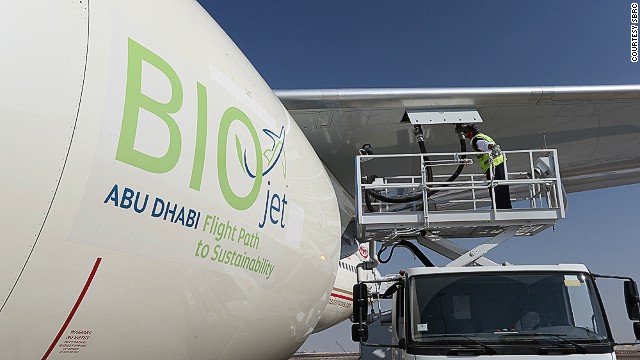Green Skies

Aviation has been a mainstay in transportation ever since its inception when the Wright brothers took to the skies over 100 years ago. While aviation has been a crowning technical achievement many tend to forget the byproducts of flying, most noticeably the emissions. A single jet engine consumes several hundred gallons per hour! (Hummers would seem fuel efficient) . Yet there are thousands of planes with multiple engines flying all over the world at any given time. Which makes you wonder why the industry hasn’t been more scrutinized like so many other transportation alternatives.
On the bright side the industry has been pursuing more sustainable standards. The latest case is a partnership between Boeing (plane manufacture) and the United Arab Emirates government to build a biofuel supply chain. These biofuels are expected to produce 50% less CO2 than fossil fuels over its lifecycle. More importantly the source of biofuels also captures carbon which can contain the amount of green house gases emitted every year.
Its apparent that the aviation industry continues to face a daunting task in adopting sustainable practices. Whereas other industries can employ accentuate or acquire initiatives the aviation industry cannot due to their operation structure therefore solely relying on being architects of their industry. Luckily for us and the world the high and turbulent cost of jet fuel have airlines and manufactures scrambling to find alternatives to fossil fuels. High fuel prices have shown economic factors can influence world markets into adopting more sustainable practices that also benefit the economy. Despite the political bickering over climate change industries are embracing sustainability not just for to appeal to consumer demand but to continual adopt to the ever dynamic economy.
Sources:
Desert plants and green diesel: Meet the jet fuels of the future
Hey Sidney, this is a good example of how price can influence environmental behavior (at least on the part of airlines). As the price of traditional fuel goes up, demand goes down, and alternatives fuels are used instead, just as traditional economic theory would predict. Where it gets more interesting, I think, is when you start looking at very subtle ways in which the way a decision is framed that can powerfully influence consumer decision making. Take a look at this paper by Sauder prof Kate White if you’re interested, which shows that framing an environmental decision in either abstract or concrete terms, or gain versus loss terms can predictably influence decision-making: http://journals.ama.org/doi/abs/10.1509/jmkr.48.3.472
It would be interesting to think about how this can be applied to persuading consumers to purchase carbon offsets for their flights, for example.
Hi Sidney. Great topic. I think that there are lots of different considerations to look at on this topic as well. Such as how the airline industry has actually greatly improved fuel efficiency in the last 20 years, or whether flying is actually more fuel efficient than driving, per person (I believe it is). I do definitely agree though that market economics of fuel prices means airlines are getting squeezed especially hard from rising fuel costs (just look at Air Canada’s P&Ls). This means that they should be especially focused on alternatives to jet fuel planes, despite the massive R&D and investment required (building new planes isn’t cheap). I wonder how deep into the R&D companies like Air Canada already are!
Cheers.